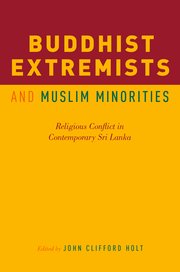 Religious Conflict in Contemporary Sri Lanka
Religious Conflict in Contemporary Sri Lanka
Edited by John Holt, Hargrave Press, October 31, 2016
- Proposes an alternative view of Muslims where, unlike in the Middle East, they are the victims of majoritarian politics
- Discusses events that invert the common stereotypes of Buddhists as pacifists and Muslims as violent jihadists
254 Pages | 5 illus.
6-1/8 x 9-1/4 inches
ISBN: 9780190624378
1. Sinhala Buddhist Nationalism and Muslim Identity in Sri Lanka: One Hundred Years of Conflict and Coexistence
By M. A. Nuhman
2. Rethinking Muslim Identity in Sri Lanka
By Dennis B. McGilvray
3. Refuge in the State: Buddhist Monks and Virtuous Governmentality
By Jonathan A. Young
4. Configurations of Buddhist Nationalism in Modern Sri Lanka
By Benjamin Schonthal
5. Gossip, Rumor and Propaganda in Anti-Muslim Campaigns of the Bodu Bala Sena
By Kalinga Tudor Silva
6. Adjudicating Antiquity: The Politics of Historical Confrontation at Devanagala, Sri Lanka
By Philip Friedrich
7. Stories in the Aftermath of Aluthgama
By Farzana Haniffa
8. A Religious Syntax to Recent Communal Violence in Sri Lanka
By John Clifford Holt
Bibliography
Notes about Contributors
When the civil war in Sri Lanka between Sinhala Buddhists and Tamils ended in 2009, many Sri Lankans and foreign observers alike hoped to see the re-establishment of relatively harmonious religious and ethnic relations among the various communities in the country. Instead, a different type of violence erupted, this time aimed at the Muslim community. The essays in Buddhist Extremists and Muslim Minoritiesinvestigate the history and current state of Buddhist-Muslim relations in Sri Lanka, in an attempt to identify the causes of this newly emergent conflict. Euro-American readers unfamiliar with this story will be surprised to learn that it inverts common stereotypes of the two religious groups. In this context, certain groups of Buddhists, generally considered peace-oriented in the West, are engaged in victimizing Muslims, who are increasingly seen as militant. The authors examine the historical contexts and substantive reasons that gave rise to Buddhist nationalism and aggressive attacks on Muslim communities. The rise of Buddhist nationalism in general is analyzed and explained, while the specific role, methods, and character of the militant Bodu Bala Sena (“Army of Buddhist Power”) movement receive particular scrutiny. The motivations for attacks on Muslims may include deep-seated perceptions of economic disparity, but elements of religious culture (ritual and symbol) are also seen as catalysts for explosive acts of violence. This much-needed, timely commentary promises to shift the standard narrative on Muslims and religious violence.
Contributors:
Philip Friedrich is a Ph.D. candidate in the Department of South Asia Studies at the University of Pennsylvania.
Farzana Haniffa is Senior Lecturer in Sociology at the University of Colombo.
John Clifford Holt (Ph.D., Chicago) is William R. Kenan, Jr. Professor of Humanities in Religion and Asian Studies at Bowdoin College.
Dennis B. McGilvray is Professor Emeritus of Anthropology at the University of Colorado, Boulder, and President of the American Institute of Sri Lankan Studies.
M. A. Nuhman, Retired Professor of Tamil, University of Peradeniya, Sri Lanka, is a well known scholar, poet, literary critic, linguist and a creative translator in Tamil.
Benjamin Schonthal is Lecturer in Buddhism / Asian Religions at the University of Otago in New Zealand.
Kalinga Tudor Silva holds a BA from the University of Peradeniya and PhD from Monash University, Australia.
Jonathan A. Young is Visiting Assistant Professor at the College of the Holy Cross in Worcester, MA.